Who was Elwin Bruno Christoffel? Information on German mathematician Elwin Bruno Christoffel biography, life story, works and contributions to science.

Elwin Bruno Christoffel (Source: wikipedia.org)
Elwin Bruno Christoffel
Elwin Bruno Christoffel (March 17, 1829 – April 26, 1900) was a German mathematician who made significant contributions to the fields of geometry and mathematical analysis.
Christoffel was born in Münster, Germany and studied mathematics at the University of Berlin, where he earned his Ph.D. in 1854. After completing his degree, he began working as a professor of mathematics at the University of Breslau, where he taught until 1868.
Christoffel is known for his work on the theory of functions of a complex variable and his contributions to the study of differential equations. He is also credited with introducing the concept of the “Christoffel symbols,” which are important in the study of the mathematical theory of relativity.
In addition to his work on mathematics, Christoffel was also interested in the history of mathematics and made significant contributions to the field of the history of mathematics through his research and writing. He was a member of several scientific societies and was highly respected in the academic community.
Christoffel died in 1900 at the age of 71. His work had a significant impact on the field of mathematics and his contributions continue to be recognized and studied by mathematicians today.
Contributions to Math
Elwin Bruno Christoffel made significant contributions to the fields of geometry and mathematical analysis. He is known for his work on the theory of functions of a complex variable and his contributions to the study of differential equations.
One of Christoffel’s most notable contributions to mathematics was the introduction of the “Christoffel symbols,” which are used in the study of the mathematical theory of relativity. These symbols are used to describe the curvature of spacetime and play a crucial role in the development of mathematical models of the physical world.
Christoffel also made important contributions to the field of the history of mathematics. He conducted research on the history of mathematics and published several papers and books on the topic.
Overall, Christoffel’s contributions to mathematics had a significant impact and continue to be studied and recognized by mathematicians today.
Bio 2
Elwin Bruno Christoffel; (1829-1900), German mathematician, who introduced covariant differentiation in the study of higher dimensional geometry. He was born in Montjoie (now Monschau), near the Belgian border, on Nov. 10, 1829. Christoffel studied at the University of Berlin and was strongly influenced by Dirichlet and the works of Riemann. He graduated from Berlin in 1856. In 1862, Christoffel succeeded Dedekind as professor at the Polytechnicum in Zurich and then helped to establish a department of mathematics at the University of Strasbourg when it reopened in 1872 as a German university following the Franco-Prussian War of 1870-1871.
Christoffel published memoirs on the theory of functions, where the important Schwartz-Christoffel formula bears his name, and he completed a long paper on the theta function only a few weeks before his death at Strasbourg on March 15, 1900. In a paper of 1869 on quadratic differential forms he introduced the expression, later called covariant differentiation by Ricci, that became basic to the study of the differential calculus of higher dimensional surfaces. The ideas of this paper have important applications in tensor analysis, where they lead to the “Riemann-Christoffel curvature tensor,” which is well known in general relativity theory.